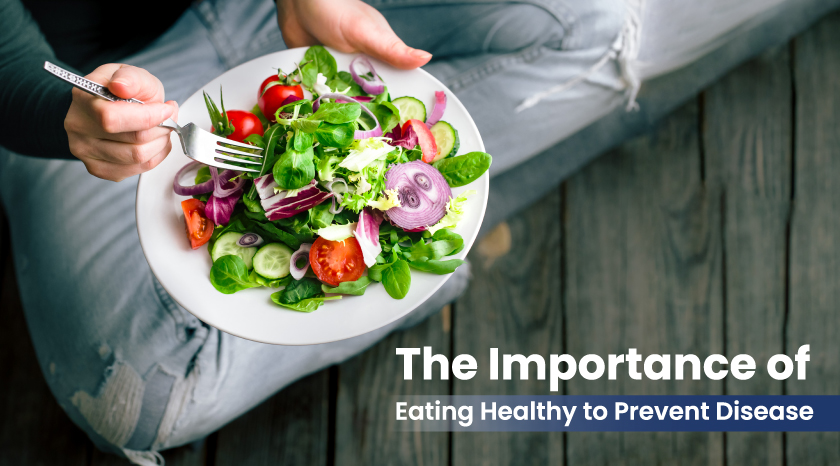In today’s fast-paced world, where convenience often trumps nutrition, the importance of eating healthy cannot be overstated. A balanced diet is a cornerstone of good health, playing a crucial role in preventing a myriad of diseases and promoting overall well-being. By making mindful food choices, individuals can significantly reduce their risk of chronic illnesses and enhance their quality of life.
The Link Between Diet and Disease
The food we consume has a direct impact on our health. A diet rich in nutrients provides the body with essential vitamins, minerals, and antioxidants that support various bodily functions. Conversely, a diet high in processed foods, sugars, and unhealthy fats can lead to nutritional deficiencies and increase the risk of chronic diseases. Here’s how a healthy diet helps prevent common health issues:
- Heart Disease: Heart disease is one of the leading causes of death worldwide. Diets high in saturated fats, trans fats, and cholesterol can lead to the buildup of plaque in the arteries, increasing the risk of heart attacks and strokes. Eating a diet rich in fruits, vegetables, whole grains, and lean proteins helps maintain heart health by reducing bad cholesterol (LDL) and increasing good cholesterol (HDL).
- Diabetes: Type 2 diabetes is closely linked to diet and lifestyle. Consuming a diet high in refined sugars and carbohydrates can cause insulin resistance, leading to diabetes. A balanced diet with low-glycemic index foods, fiber, and healthy fats can help regulate blood sugar levels and prevent the onset of diabetes.
- Obesity: Obesity is a major risk factor for many chronic diseases, including heart disease, diabetes, and certain cancers. Maintaining a healthy weight through a balanced diet and regular exercise can prevent obesity and its associated health risks.
- Cancer: Some dietary factors are linked to an increased risk of cancer. Diets high in processed meats, red meats, and alcohol have been associated with certain types of cancer. Conversely, a diet rich in fruits, vegetables, and whole grains provides antioxidants and phytochemicals that protect against cancer.
- Digestive Health: A diet high in fiber promotes healthy digestion and prevents conditions such as constipation, diverticulitis, and irritable bowel syndrome (IBS). Probiotics found in fermented foods can also support a healthy gut microbiome, which is essential for overall health.
- Bone Health: Calcium and vitamin D are critical for maintaining strong bones and preventing osteoporosis. A diet that includes dairy products, leafy greens, and fortified foods can ensure adequate intake of these essential nutrients.
Key Components of a Healthy Diet
A healthy diet is not about strict limitations but about making smart choices that promote health and well-being. Here are some key components of a balanced diet:
- Fruits and Vegetables: These should make up a large portion of your diet. They are low in calories but high in essential nutrients and antioxidants.
- Whole Grains: Choose whole grains over refined grains. Whole grains like brown rice, quinoa, and whole-wheat products provide more fiber and nutrients.
- Lean Proteins: Include sources of lean protein such as fish, poultry, beans, and legumes. These foods are important for muscle repair and growth.
- Healthy Fats: Incorporate healthy fats from sources like avocados, nuts, seeds, and olive oil. These fats are essential for brain health and hormone production.
- Hydration: Drink plenty of water throughout the day. Proper hydration is crucial for all bodily functions and can help prevent overeating.
- Limit Processed Foods: Reduce the intake of processed and sugary foods. These often contain unhealthy fats, sugars, and preservatives that can harm your health.
Practical Tips for Eating Healthy
Adopting a healthy diet is a gradual process that involves making small, sustainable changes. Here are some practical tips to help you get started:
- Plan Your Meals: Planning your meals ahead of time can help you make healthier choices and avoid last-minute unhealthy options.
- Cook at Home: Preparing meals at home allows you to control the ingredients and cooking methods, ensuring healthier meals.
- Read Labels: Pay attention to food labels and choose products with fewer additives and lower amounts of sugar, sodium, and unhealthy fats.
- Portion Control: Be mindful of portion sizes to avoid overeating. Eating smaller, more frequent meals can help maintain energy levels and prevent hunger.
- Mindful Eating: Practice mindful eating by paying attention to your hunger and fullness cues, and savoring each bite without distractions.
Eating healthy is one of the most effective ways to prevent disease and promote overall health. By incorporating a variety of nutrient-rich foods into your diet and making mindful choices, you can significantly reduce your risk of chronic illnesses and improve your quality of life. Remember, a healthy diet is not about restriction but about balance and making choices that nourish your body and mind. Start today by making small changes, and enjoy the long-term benefits of a healthier lifestyle.




